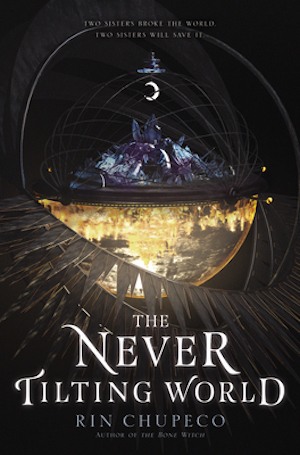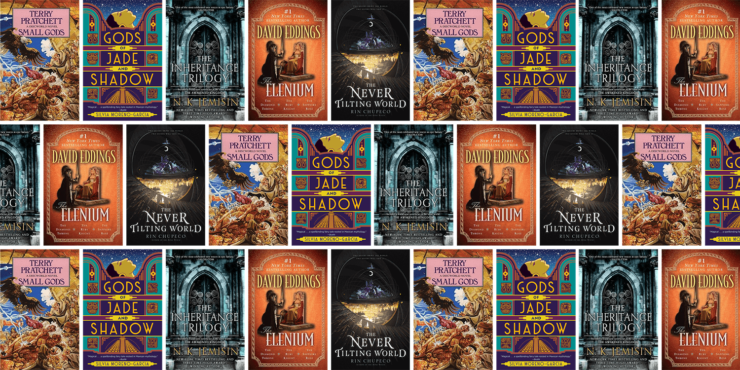Gods might have made people in their image, but when the gods themselves are unmitigated bastards with their own hidden agendas, then no one is truly safe. I grew up with both the threat of hellfire and damnation due to my Catholic upbringing in a majority Catholic country, yet still practiced Buddhism alongside it due in part to Asian parents, where it was taught that the worthiest of saints can ascend to the heavens with something very much like godhood, and where the gods too, can be fickle and contrary. The contradiction has always remained a source of fascination for me, and the idea of flawed gods, how not even beliefs are not always set in stone, have heavily influenced how I write my stories.
In my book, The Never Tilting World, and its upcoming sequel, The Ever Cruel Kingdom, the goddesses had been very selfish. Now, Aeon is a planet waiting to die, split by a permanent, storm-swept night on one side and an unrelenting, scorching heat on the other. The resulting cataclysm had spawned the Great Abyss, where demons and other creatures of the damned crawl out of to terrorize what’s left of humankind. Naturally, the people blame the deities in charge, whose rash decision, made in a moment of weakness, had resulted in Aeon’s destruction. But the goddesses’ daughters, Haidee and Odessa, have also survived—and both are determined to change Aeon’s destiny before it’s too late, no matter the cost. But they are still their mothers’ daughters, and are just as susceptible to the same flaws that had caused the Great Abyss in the first place.
Buy the Book


The Never Tilting World
Misbehaving deities are a popular theme in the fantasy genre, but what makes these stories especially compelling to me is that when things go sideways for the gods and those who worship them, they almost always go south in the worst ways possible, making everything a matter of life or death. Below I talk briefly about some of my favorite series dealing with such gods and the resulting fallout from their destructive whims.
The Inheritance Trilogy by N. K. Jemisin
Enslavement is the worst thing to happen to any god, and it’s especially fatal to the people who incur the wrath of those who control them. Such is Yeine’s situation in The Hundred Thousand Kingdoms, the first book in the series, where she is summoned to the floating city of Sky and named its ruler’s heir along with two other competitors for the throne. In the struggle to survive the captive gods long enough to solve her mother’s murder and ascend the throne, Yeine will discover her connection with these powerful deities and make a fateful choice. The brilliant way Jemisin carries out the plot, resulting in that ultimate, final choice, cements this for me as one of my favorite reads, and enforces my love for trickster gods (I’m looking at you, Sieh!)
The second and third books also deal with the fallen beings who’d been rendered powerless and human from the events of the first book, and their fight to regain their godhoods by whatever means they can in their much more vulnerable bodies.
The Belgariad by David Eddings
Prophecy moves in strange ways; not even the gods can change their destinies. But the evil god Torak is unwilling to accept his fate, and he’s prepared to wreak destruction upon the world and corrupt the prophecies to ensure it is he who emerges victorious. And when the young farmboy Garion discovers that he is the chosen one born to fight that ancient evil—and that his Aunt Pol and Grandfather Belgarath are not the simple folk they said they were, but are in fact two of the greatest magicians in the world—nothing will ever be the same again. I read these five books as a very young teenager, and I still learn a lot about how to write character likability—and also how not to write them—from this series.
Small Gods by Terry Pratchett
I am a huge fan of Pratchett, and even when it’s hard to choose which of his Discworld books are my favorite, Small Gods is one that ranks high up that list. In an attempt to reincarnate himself for the eighth time, the god Om discovers that his powers are gone, that all but one of his faithful still believes in him (and even they have some doubts on that score), and that he’s now stuck in the body of a mostly useless tortoise. In his quest to once again regain his abilities, Om and his lone follower go on a journey through libraries and deserts, and weather through the (in)Quisition, where he learns compassion with his newfound mortality. The book was intended as a satire of religion, but it’s got the most heart out of any book I’ve ever read.
Gods of Jade and Shadow by Silvia Moreno-Garcia
This beautifully written books tells the story of Casiopea, who finds the bones of the death-god Hun-Kamé in her grandfather’s chest, and is bonded to him as a consequence., Tand that pitch alone blew my mind when I first heard of it. A god searching for his own body parts? I love the macabreness of it!
Now tasked with finding the rest of the deity’s body, Casiopea must navigate a world full of spirits and demons while Hun-Kamé seeks to take back rulership of Xibalba, the Mayan underworld, from his brother, Hukub- Kamé – the one responsible for imprisoning him in the first place.
Fengshen Yanyi / Investiture of the Gods
Allegedly written by Xu Zhonglin, the Fengshen Yanyi is one of the most popular works in Chinese literature, and is a fictionalized retelling of King Zhòu and the decline of the Shang dynasty. For a sprawling epic with roughly a hundred chapters that detail the bloody wars preceding the Zhōu dynasty, the catalyst to the conflict was a rather small offense—King Zhòu had disrespected the goddess, Nuwa, by writing lustful poems about her on the walls of her temple. Naturally, the only way to regain her honor was to send fox spirits posing as courtesans to enchant him and bring about an end to his reign—violently. A reasonable progression of events I suppose, when you’re the goddess responsible for creating the whole of humanity.
Rin Chupeco wrote obscure manuals for complicated computer programs, talked people out of their money at event shows, and did many other terrible things. They now write about ghosts and fairy tales but is still sometimes mistaken as a revenant. They were born and raised in the Philippines and, or so the legend goes, still haunts that place to this very day. They wrote The Girl from the Well, The Bone Witch, and the Hundred Names for Magic series. Her next book, The Never Tilting World, is the sequel to The Ever Cruel Kingdom, and will be out from HarperTeen on November 10, 2020.










